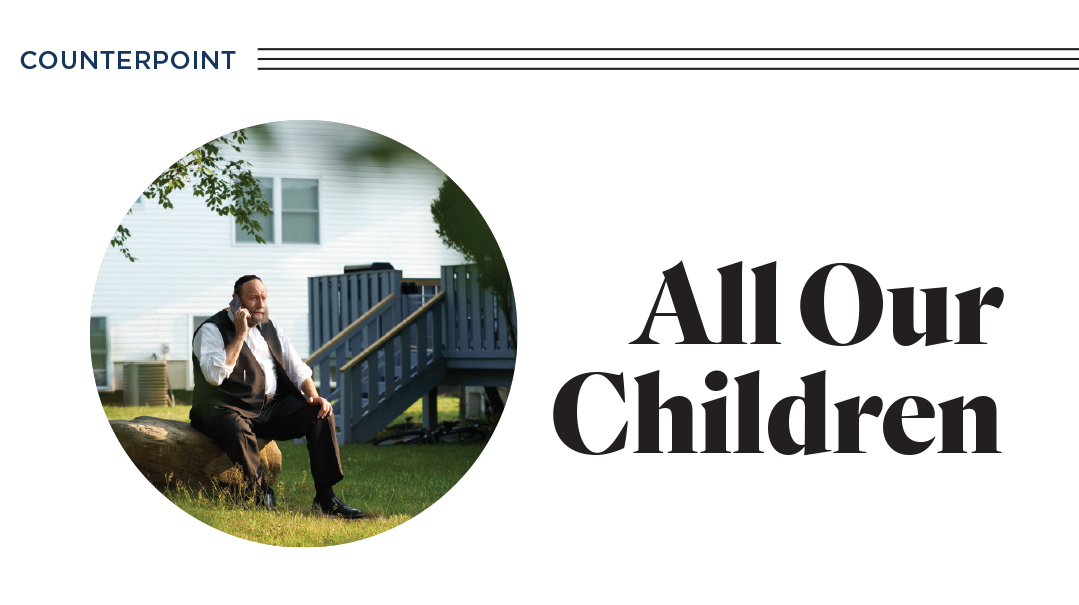Yiddishe Gelt: The conversation continues

"The discrepancy between the rebbeim and teachers’ gifts is definitely not warranted"

Required Reading
B. Neuhoff, Brooklyn, New York.
I would like to commend you on the excellent Succos supplement “Yiddishe Gelt.” I read it from cover to cover and urged my children and grandchildren to read it as well. In fact, I think it should be required reading for all young adults and, indeed, for anyone whose grasp of financial literacy consists of “Earn it, spend it” or “Want it, get it.”
The cautionary tales were revealing, the experts’ advice invaluable, and Rabbi Reisman, as always, pitch perfect. You handled a heavy topic with a light and deft hand. Very well done!
My Personal Priority
L.K.
I read and reread the supplement about frum finances with great interest. It’s definitely one of those mysterious topics that I’ve always tried to make sense of. Seems that there are a lot of creative ways people make ends meet, a lot of siyata d’Shmaya, and a lot of unsolved problems and debt, too.
As a poor middle-classer, both me and my husband working, with four kids kein ayin hara, we are budgeted and work very hard to live within our means. And a struggle it is. Life is very expensive. And no, we don’t get a free dime.
But one thing I do prioritize is cleaning help. I’ll scrimp on food and clothing so I have the money for it because it makes such a difference in how calm and attentive a mother I am able to be.
I was wondering why it wasn’t mentioned in even one profile? Isn’t this a necessary expense in our busy frum lives with kids and jobs and family obligations and Yom Tov and all?
I would be curious to hear what others think about this expense. Do they manage without outside help? If yes, how do they juggle that? Are there others out there who are on a shoestring budget but make this a priority, too?
Don’t Deprive Your Children
Name Withheld
Wow! The “Yiddishe Gelt” supplement was so good, long overdue.
There’s one point I want to mention. Some parents are busy depriving children from extras because they do not want to spoil their kids. But these same parents do not stop spending on remodeling their home — room after room, paint, scrape, new moldings, light construction…. To teach children not to want so much starts at the parents. Children see what their parents’ priorities are, and that is what they copy.
I am a generous balabatish person, but not on someone else’s cheshbon. I would never borrow for luxury. I am not scared to say no when my children ask for very expensive things because I am confident that I am okay with not having expensive things regularly myself.
Parents need to know their priorities, and to give a message to children not to want so many things, through their own personal example. It is not a “kintz” to teach children not to have when we parents want everything.
I once saw a mother shop with a child. The child wanted a nosh, and the mother yelled, “You shouldn’t expect a nosh every time I take you to the grocery.” Five minutes later the mother went with her friend next door to sit down for lunch, which cost about $35 to $40. What did she teach her child? That she is the mother and she can have whatever she wants every time she does grocery shopping.
That said, I don’t deprive my children from having what the majority of the community’s children have. Handling money wisely and budgeting doesn’t equal deprivation. Deprived kids get nowhere.
So choose your priorities carefully and make sure your children understand that there are limits but still feel socially accepted and not deprived. You don’t need to fall into debt, but you should think before you say no.
Our Climb Out of Debt
L.P., Israel
One word for this supplement: Amazing!
What an incredible, honest, and much-needed supplement and areas to cover. I loved each portion and how you included different areas of finances, debt, and Jewish spending.
I have been married for less than three years, and my husband and I find ourselves in about $10,000 of debt (some of it is from my husband’s single days). I felt so validated as I read the stories about debt, and almost every individual wrote something to the tune of “nobody gets into debt on purpose, it just happens.” It’s really true — and although getting into debt was a huge mistake, it made me feel better that I’m not the only one whom this happened to so quickly. It also opened my eyes to realize that I cannot ignore my debt (I’ve been making tiny monthly payments) and need to face the reality.
When my husband and I realized we were in real trouble, we turned to RSK (Reb Shayala’s Kitchen) — an incredible organization similar to Mesila — that offers financial coaching at a discounted rate. Mrs. Lauren Hershkowitz, our amazing coach, has guided us and given us such amazing advice for our practical spending, as well as a hashkafic approach.
The first step was to stop using our credit card, which Mrs. Hershkowitz suggested in the most gentle way. At first my husband and I were shocked; how could we stop? Our credit card is our source of income! Baruch Hashem, we have managed to stop using it, a huge accomplishment for us.
Now we use the very detailed Excel sheet they gave us to track our income and expenses. We are still in the beginning stages, but b’ezras Hashem we will get there soon.
I hope you’ll print more supplements and articles like these — I look forward to reading them!
Start Them Young
Joel (Yossi) Shandelman, Monsey, NY
I congratulate you on bringing the topic of financial challenges in our community to the forefront of essential and relevant topics for the Mishpacha readership. If I had to sum up the current viewpoints, I would say that they are mostly aligned with a “sur meira” perspective of getting out of indebtedness.
Of course, before one can progress to the “aseh tov” of fiscal responsibility, one must go through the “sur meira.” Having read the supplement cover to cover, I think it was only Josh Hurewitz that promoted two very important concepts toward aseh tov when he said: 1) Pay yourself first, and 2) Teach your kids by raising fiscally literate children. The earlier children learn the value of money, the sooner they will be able to control money rather than letting money control them.
While we tend not to discuss money with our children, as we don’t think the stress of money management is appropriate for them at a young age, I do believe that teaching fiscal literacy in the teenage years, and perhaps even earlier, is essential.
For example, when a teenager babysits and earns between $10 and $14 an hour, what does the teenager do with the money? I suspect that the parents would prefer they spend it on whatever it was they were going to ask the parents to provide. One less stress on the parents. But in reality, we should be teaching our children that while one must (at least initially) work for money, the long-term goal is really for their money to work for them.
Every dollar that a teenager earns can become a “worker bee” in an investment account that continues to work and earn dividends day in, day out. The compounding of interest from dividends will multiply and increase such that when they are ready to marry a kollel husband or make a significant purchase, they will have a base to take it from and not need to use a credit card to finance their purchases.
There are many tools in the financial toolbox. Educating our children at a young age to know and employ those tools will go a long way toward teaching fiscal responsibility and financial independence.
Lastly, reading is essential, and to that end I would recommend a very good book for teenagers and adults alike titled Rich Dad Poor Dad, which provides the psychology of money management from both Dads’ perspectives. It could easily become a launchpad for parent-children discussions on fiscal literacy and financial independence.
I look forward to future articles that will focus on the aseh tov of financial literacy.
Unfair Gap
L.M., Brooklyn, NY
Thank you for the beautiful Succos edition. In the “Yiddishe Gelt” supplement, I noticed a disturbing trend. Six out of the seven interviewees said that they gift the rebbeim a significantly greater amount than the morahs. To quote, “Purim-time, we give the rebbeim $50 cash and the morahs a small gift worth about $10,” and “$75 to $100 to rebbeim and $18 to $25 to teachers at Purim.”
Our morahs work extremely hard, especially if they teach boys in the older grades. “A small gift worth about $10” is not going to cut it in showing your appreciation, especially if you’re giving the rebbeim “$50 cash.”
I understand that the rebbeim are expected to go the extra mile when it comes to their talmidim, such as attending bar mitzvahs and the like, but the discrepancy between the rebbeim and teachers’ gifts is definitely not warranted. Many times, with a husband in kollel, these teachers are the primary breadwinners for their families, in addition to taking care of their households.
I always make it a point to give my children’s rebbeim and teachers the same amount and to write both of them nice cards detailing my appreciation for the hard work they each put into my child’s chinuch. I wish more people would do the same.
(Originally featured in Mishpacha, Issue 880)
Oops! We could not locate your form.





